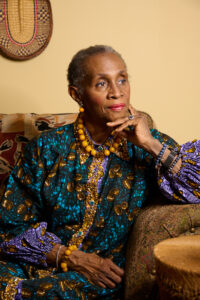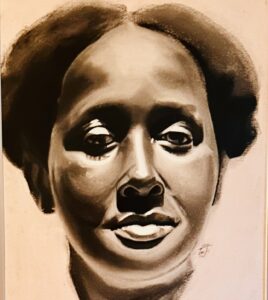“Her Voice Lives”:
How Dr. Renee Campbell Transformed a Family Tragedy into a Mission for Justice

Dr. Renee Campbell. Photo credit: John Nation
In 2003, Dr. Renee Campbell received a $1,500 grant from the Kentucky Foundation for Women (KFW) to research the life and death of her grandmother, Mrs. Ada Doss Campbell—a woman she had never met but felt deeply drawn to understand. Dr. Campbell remembers the moment she received the grant clearly: “I was really happy and excited and, you know, just smiling… ‘Oh wow… I can’t believe this.’”
The grant set into motion a decades-long journey that has rippled across Kentucky and beyond, giving voice to her grandmother, whose life was silenced by institutional neglect and historical erasure.
Dr. Campbell began with very little information. Her father, Walter L. Campbell Sr., was taken from his mother when he was only two years old; her uncle was seven. Both grew up never knowing what truly happened. With the grant’s support, Dr. Campbell traveled, interviewed relatives, and obtained a court order to access her grandmother’s medical records from Central State Hospital, then known as Lakeland Asylum.
What she found shocked her. She said, “They documented that she had labored pneumonia, meaning she coughed herself to death.” The medical record stated plainly: “She was sent to bed on Saturday night and given no medication… she went into pleurisy and effusion, and died… from professional medical neglect.”

Mrs. Ada Doss Campbell. Artist credit: LJ Bryant
She also found letters from her grandfather, begging administrators for permission to see his wife or to bring her home: “He wrote a letter… asking if he could come see her. And they told him no.” Reflecting on these documents, Dr. Campbell says, “I still can’t get that out of my mind. Even today.”
These records revealed not only medical neglect, but also layers of systemic racism, institutional cruelty, and the unique vulnerabilities of Black women during that time, vulnerabilities still resonating today.
For years after the grant, life and family obligations pulled Dr. Campbell in other directions. But in 2020, the murders of Breonna Taylor and George Floyd stirred something in her. She says, “When the incident happened to George Floyd and Breonna Taylor, I said to myself… I need to go ahead and try to make people aware of this story.”
A single LinkedIn post about her grandmother’s story started a wave of community support. Interdisciplinary artist Marlesha Sara reached out, and together they began speaking publicly and building projects that drew the attention of civic leaders, advocates, and cultural institutions.
Everywhere she shared Mrs. Ada’s story, someone resonated with it. As Dr. Campbell explains, “Whenever I tell the story, there’s somebody that identifies with it—someone who’s had a relative with mental health issues or who’s faced disparities.”
Her advocacy has now taken her to dozens of platforms across the state, transforming her grandmother’s story into a catalyst for awareness about racial disparities, gender discrimination, and the mistreatment of marginalized people in institutional settings. This work has led to a Citation of Adjournment on the floor of the Kentucky House of Representatives, an interview with Rachel Platt at the Frazier History Museum, news coverage from Shay McAlaster of WHAS News, speaking engagements with the Louisville Metro Office for Women, Metro Human Relations Commission, and the Portland Museum, and community collaboration with leaders like Reba Cobb, Marsha Weinstein, and Jane Emke.
She also partnered with Central State Hospital and the Kentucky Department for Behavioral Health to install a memorial bench honoring her grandmother at E.P. “Tom” Sawyer Park, the site of her grandmother’s burial.
Her advocacy helped establish the Mrs. Ada Doss Campbell Memorial Scholarship at the Community Foundation and another scholarship at Kentucky State University supporting social work students who will continue the work of care, justice, and systemic change. “It’s just going to go on and on and on,” Dr. Campbell says. “All because I told her story.”

Artwork credit: LJ Bryant
This project has expanded Dr. Campbell’s own identity as an artist. “When something touches me deeply, I have to spring forward and do something about it. There’s no way that I’m not going to.” She is currently writing a book, A Voice: The Ada Doss Campbell Story, and developing a theatrical production that will dramatize both her grandmother’s experience and the ripple effects on the lives of her father and uncle, who were children at the time. She describes the play as “very experiential,” a way for audiences to feel the emotional truth of what happened.
The KFW grant did more than fund research; it validated Dr. Campbell’s instinct that the story mattered. As she shared: “I was so pleasantly surprised that a foundation thought it was important for me, a Black woman, to be supported financially to do this research.”
Dr. Campbell’s work is ongoing, and she invites others to join her in ensuring her grandmother’s voice continues to live on. If you would like to invite Dr. Campbell to speak or collaborate, she welcomes inquiries, saying “Any opportunity that I get, I take and tell her story.”
—
Contact Dr. Renee Campbell at: reneeghana@gmail.com



